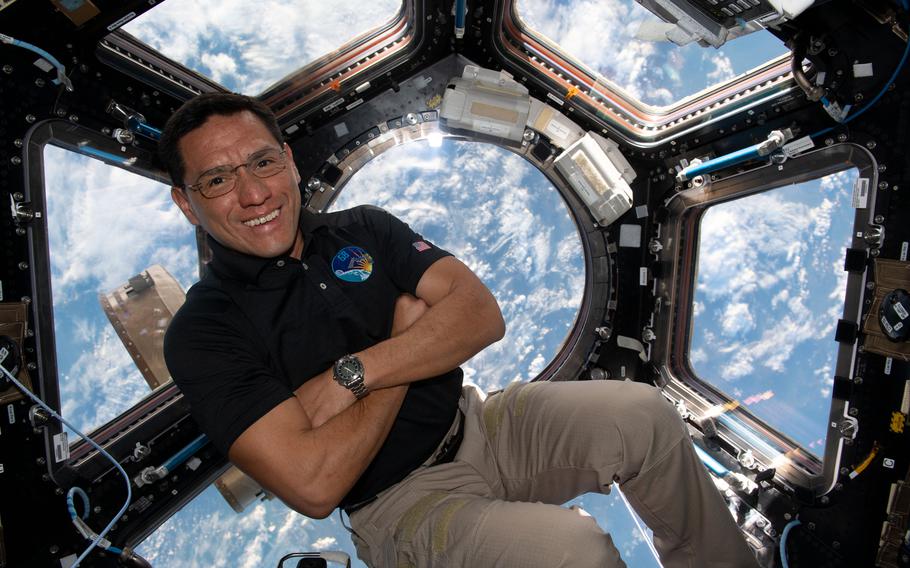
NASA astronaut Frank Rubio inside the cupola, the International Space Station’s “window to the world.” (Frank Rubio/NASA)
It was six months overdue, but NASA astronaut and Army Lt. Col. Frank Rubio’s marathon 371-day mission in space — which set the record for the longest continuous spaceflight on record by an American — finally came to an end Wednesday morning as Rubio’s Soyuz spacecraft deployed its parachute and settled gently on the steppe of Kazakhstan.
“It’s good to be home,” Rubio said, from a reclining chair where he rested for a few minutes to regain his equilibrium after being carried out the capsule. Draped in a blanket, the NASA astronaut smiled, wiped his forehead and said he felt good.
He landed exactly on schedule at 7.17 a.m. Eastern Time in a “bullseye touchdown,” according to NASA’s commentator — following a roughly 15-minute parachute-assisted descent.
After changing out of his space suit, Rubio will be transported by helicopter to the nearby Kazakh city of Karaganda — before boarding a NASA flight back to Houston.
During the final minutes of Rubio’s 371-day stay at the International Space Station, a NASA live feed camera showed Rubio shaking hands and hugging friends, occasionally smiling and looking at his wristwatch. Rubio’s final act at the space center was to pose for some last-minute photos before entering the Soyuz MS-23 vehicle that was to take him home. Hatches of the spacecraft closed at 00:41 a.m. Wednesday, according to NASA.
For an anxious few months, Rubio’s return had been in doubt. The spacecraft that he clambered into was a hasty replacement for the Soyuz that launched to bring him and two Russian cosmonauts, Sergey Prokopyev and Dmitri Petelin, to the International Space Station on Sept. 21, 2022. A coolant leak on that vessel required NASA and Russian space agency Roscosmos to send Rubio and his stranded crewmates a replacement spacecraft for their ride home, delaying the arrival of a new team of astronauts to relieve them.
And so Rubio’s planned six-month stay on the International Space Station was doubled, landing him a NASA record. Rubio’s 371-day spaceflight topped the previous record of 355 days held by Mark Vande Hei, who returned from the space station in March 2022. During Rubio’s mission, he traveled 157 million miles, or 5,963 orbits of the Earth, NASA said.
The world record for the longest continuous spaceflight is held by Russian cosmonaut Valeri Polyakov, who spent 437 days aboard the Russian space station Mir between 1994 and 1995.
Rubio told reporters last week that spending the extra time away from his family in Miami taxed him. Faced upfront with the prospect of spending a year aboard the ISS, “I probably would have declined,” he said. But he knew he was signing up for the unexpected as an astronaut. Rubio credited the other 28 crewmates who rotated through the space station during his stay for keeping his spirits up.
“To have flown with that many people … is really pretty special,” Rubio said in a September interview with Vande Hei shared by NASA.
Rubio made the most of his extra time in orbit. He helped conduct several science experiments aboard the International Space Station, including six geared toward studying the effects of prolonged spaceflight on the human body. Rubio grew tomatoes aboard the space station, tested zero-gravity exercise equipment and provided biological samples that will help NASA plan for future missions to the moon and Mars that could extend even longer than his spaceflight, the agency said.
Greater than Rubio’s feat of resilience, though, was his family’s, he told Vande Hei.
“Really, my family has been kind of the cornerstone that’s inspired me to hopefully keep somewhat of a good attitude while I’ve been up here,” Rubio said. “The resilience that my wife and kids showed. They faced a lot of challenges this past year, and they just thrived throughout the whole entire process.”
Rubio said he’d relax in the quiet of his Miami backyard upon returning to Earth. After he lands in Kazakhstan, he’ll return with NASA to Houston, where he’ll be just one more short flight away from home. This one, hopefully, won’t be delayed.
Andrew Jeong in Seoul contributed to this report.